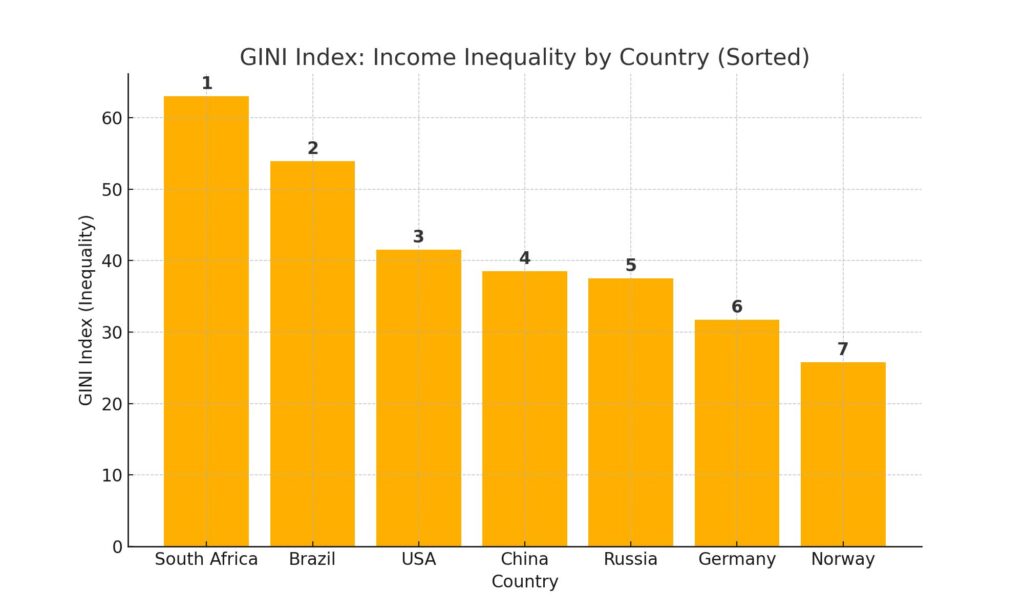Economic inequality has grown worldwide, creating deep social and financial divisions. As the gap between the rich and poor continues to widen, economic opportunities shrink for many, and psychological well-being deteriorates. Mental health issues, including anxiety, depression, and severe psychiatric disorders, have become more prevalent as a result. In countries with high inequality, mental health outcomes tend to be worse. People at the lower end of the income scale experience more stress, limited access to care, and higher rates of suicide. Economic inequality and mental health represent an extreme problem.
The situation in the United States highlights these problems. Homelessness among the mentally ill has surged to unprecedented levels. Many people with severe disorders lack food, shelter, and medical care. Allen Frances, a former chairman of psychiatry at Duke University, describes the current era as “the worst time to be mentally ill in the U.S.” Decades ago, patients had access to psychiatric hospitals. Now, they either live on the streets or cycle through jails, receiving little to no treatment.
Developing countries face even greater struggles. Limited healthcare infrastructure, social stigma, and extreme poverty create devastating conditions for those with mental illness. More than 150 million people in India need mental healthcare, yet only 5,000 psychiatrists serve a population of over 1.4 billion. In China, over 200 million people suffer from mental health disorders, yet most never receive treatment. Many mentally ill individuals in rural villages are chained by their families because of the lack of medical resources. Inequality restricts access to care, leaving millions untreated.
China has a significant shortage of psychiatrists relative to its population. Estimates suggest that there are around 50,000–60,000 psychiatrists in China, serving a population of over 1.4 billion people. This equates to roughly 4 psychiatrists per 100,000 people, which is far below the rates in many Western countries. I often joke (and actually, it is not funny) that China has as many psychiatrists as Poland has.
The shortage is even more severe in rural areas, where mental health services are extremely limited. The Chinese government has been expanding psychiatric training programs and integrating mental health services into general healthcare, but challenges remain due to stigma and lack of funding.
Economic inequality and the GINI index

Economic inequality can be measured using the GINI index, a statistical tool that calculates the distribution of income within a society. A score of zero represents perfect equality, while a score of one signifies extreme inequality. The United States has one of the highest GINI coefficients among developed countries, hovering around 0.41. European nations typically have lower GINI scores, ranging from 0.28 to 0.35, but inequality is rising there as well.
In the U.S., the wealthiest 1% own more than the bottom 90% combined. The top 10% of earners control over 70% of the nation’s wealth (these are official statistics, the reality is much worse). Meanwhile, wages for the lower and middle classes have stagnated for decades. Housing costs, medical bills, and student debt have skyrocketed, making economic mobility increasingly difficult. This wealth gap has significant consequences for mental health. Studies show that people in high-inequality societies suffer from higher rates of stress, anxiety, and depression.
The Global North versus Global South also worsens the situation as the latter is exploited.
Economic inequality in Europe
Europe has historically maintained lower levels of inequality due to stronger social safety nets. However, economic disparity is growing. The United Kingdom has one of the highest inequality levels in Western Europe, with a GINI coefficient of around 0.36. Countries like Germany, France, and Italy have also seen widening wealth gaps. In Eastern Europe, the transition from communism to capitalism created extreme inequality in some nations.
Rising inequality has negatively impacted mental health across the continent. Countries that implemented austerity measures, such as Greece and Spain, saw an increase in suicide rates. Cuts to healthcare and rising living costs have left many struggling with mental health issues. Unemployment and financial instability have added to the psychological burden, particularly among younger populations.
Economic inequality and mental health: The psychological impact of financial stress
Economic instability creates chronic stress. People who struggle to pay rent, buy food, or afford medical bills live in a constant state of anxiety. The uncertainty of job security and financial survival takes a serious toll on mental health. Studies show that financial stress leads to higher levels of cortisol, a hormone associated with anxiety and depression.
The effect is even more pronounced in developing countries. Many people work in informal jobs with no benefits or job security. Sudden unemployment can mean starvation or homelessness. Extreme poverty also limits access to basic healthcare, worsening both physical and mental health conditions. Political instability, war, and forced displacement add another layer of trauma for millions worldwide.
Social comparison, status anxiety, and mental health
Societies with high inequality create intense social comparison. People measure their success against those who are wealthier, leading to frustration and lower self-esteem. This phenomenon is known as status anxiety. Studies have shown that in highly unequal societies, people feel more dissatisfaction with their lives, even if they are not poor. The psychological strain of feeling “left behind” contributes to depression and anxiety.
Social media has made inequality more visible than ever. People are constantly exposed to the luxury lifestyles of the wealthy, amplifying feelings of inadequacy. In developing countries, young people in urban slums see images of Western wealth, increasing frustration over their lack of opportunities. Suicide rates among youth in low-income areas have risen as economic aspirations clash with harsh realities.
Mental health disparities and lack of access to care
Mental healthcare remains out of reach for many. In high-income countries, treatment is often expensive and concentrated in wealthier areas. For example, in the United States, psychiatric care is prohibitively expensive for many low-income individuals. In countries without universal healthcare, mental health services are even harder to access.
In developing countries, the situation is catastrophic. Now the situation in India, only 5,000 psychiatrists serve over 1.4 billion people. In China, fewer than 10% of people with mental illnesses receive treatment. Rural areas often have no psychiatrists at all. Social stigma further prevents people from seeking help. Many families hide mentally ill relatives rather than take them to a doctor. In some African countries, mentally ill individuals are chained in “healing centers” due to a lack of alternatives. In rural China, families sometimes chain mentally ill relatives inside their homes or villages because they cannot afford treatment.
Economic inequality and mental health: Severe mental illness and homelessness

People with schizophrenia, bipolar disorder, and psychotic disorders face an even greater struggle. Many of them cannot function without medication and therapy. In countries with high inequality, they are often left untreated, leading to homelessness or incarceration.
Allen Frances argues that mental illness in the U.S. has reached a breaking point. In the past, psychiatric hospitals provided food and shelter. Now, these institutions have shut down, and many mentally ill people live on the streets. Cities like Los Angeles, San Francisco, and New York have seen a surge in mentally ill homeless individuals. The country now has fewer than 40,000 psychiatric beds, down from 500,000 in the 1950s.
The role of the super-rich in addressing mental health inequality
The world’s wealthiest individuals collectively own hundreds of trillions of dollars. If even a small percentage of this wealth were allocated to mental health care, it could dramatically change outcomes worldwide.
Investments in mental healthcare could fund treatment centers, train new psychiatrists, and provide free medication to millions in need. Housing programs for the homeless mentally ill could prevent suffering and reduce crime. However, most billionaires have shown little interest in addressing this crisis. Mental health is not a profitable industry, and the wealthy often prioritize investments with financial returns.
The super-rich make sure that the world’s governments, which they influence, spend as little money as possible, leaving the most vulnerable untreated or poor.
Policy solutions and systemic change
Governments must take action to address these disparities. Universal healthcare would provide access to treatment regardless of income level. A housing-first approach could ensure that mentally ill homeless individuals receive support instead of being left on the streets. Fairer economic policies, such as progressive taxation and stronger labor protections, could reduce financial stress and improve mental well-being.
Developing countries need international support to expand their mental health services. Funding for mental health training, mobile healthcare units, and public education campaigns could improve outcomes in the poorest regions. Without intervention, inequality will continue to fuel a mental health crisis worldwide.
Conclusion
Economic inequality is a major driver of mental health disparities. The wealth gap affects psychological well-being, increases stress, and limits access to care. In countries like the U.S., homelessness among the mentally ill has reached catastrophic levels. In developing nations, millions suffer without any form of treatment. Despite the enormous resources available, little has been done to address the crisis. Without systemic change, inequality will continue to fuel a growing mental health disaster. Policymakers, healthcare professionals, and global leaders must act now to ensure that mental healthcare is a human right, not a privilege. In the best case, a global government should take on the role.

Leave a Reply